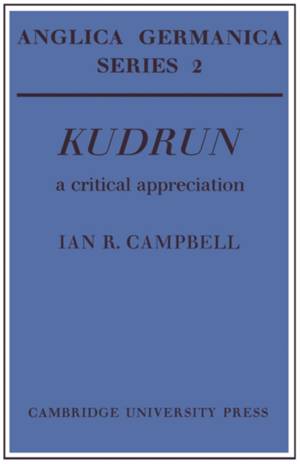
- Afhalen na 1 uur in een winkel met voorraad
- Gratis thuislevering in België vanaf € 30
- Ruim aanbod met 7 miljoen producten
- Afhalen na 1 uur in een winkel met voorraad
- Gratis thuislevering in België vanaf € 30
- Ruim aanbod met 7 miljoen producten
Zoeken
€ 60,95
+ 121 punten
Omschrijving
Kudrun is a German epic poem extant in only one manuscript, the Ambraser Handschrift of the early sixteenth century. It is thought, however, to have been composed within the decade 1230-40, and is thus contemporaneous with other epics of the classical age of Middle High German literature, such as the Nibelungenlied, Parzival and Tristan. Scholars have done Kudrun a disservice, however, by presenting it as a conscious imitator and rival of the Nibelungenlied. In this 1978 book, Dr Campbell sets the record straight and secures proper recognition for Kudrun. Regarding the epic as a unity, he pays particular attention to the language of the text, and past emendations. He also examines the degree to which characters in Kudrun impress as individual creations. Dr Campbell's conclusion is that the Kudrun poet had a keen understanding of human nature which enabled him to present his characters with impressive accuracy, consistency and vitality.
Specificaties
Betrokkenen
- Auteur(s):
- Uitgeverij:
Inhoud
- Aantal bladzijden:
- 344
- Taal:
- Engels
- Reeks:
Eigenschappen
- Productcode (EAN):
- 9780521158473
- Verschijningsdatum:
- 29/03/2012
- Uitvoering:
- Paperback
- Formaat:
- Trade paperback (VS)
- Afmetingen:
- 140 mm x 216 mm
- Gewicht:
- 435 g

Alleen bij Standaard Boekhandel
+ 121 punten op je klantenkaart van Standaard Boekhandel
Beoordelingen
We publiceren alleen reviews die voldoen aan de voorwaarden voor reviews. Bekijk onze voorwaarden voor reviews.











